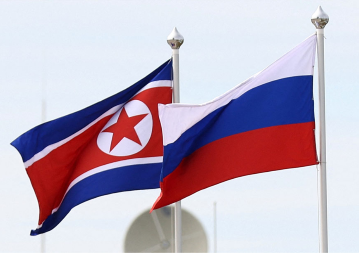"THE DISTURBING aspects of Arab democracy," wrote a columnist in Haaretz recently, "are its implications for Israel." These were listed: advent of democracy in Arab countries would make Israel lose its unique character and the "shared values" with America emanating from it; given the freedom of choice, Arab voters might elect Islamist "extremists"; Arab opinion, as per the most recent Arab Human Development Report, is trenchant in its criticism of Israeli actions in occupied territories and reflection of it in elected bodies would be worrying news. "A far-reaching soul-searching is necessary on the question of how Israel will be affected by political reforms in the region."
Paradoxically enough, one impulse for Arab democracy comes from an Israeli politician close to official Washington. It is the thesis of Nathan Sharansky that since democracies are inherently peaceable, Arab democracies would embrace Israel. Spokespersons of Arab democratic groups, on the other hand, continue to bracket domestic freedoms with the liberation of Jerusalem.
Promotion of participatory governance is not an exercise in a vacuum. The link between a reform agenda and progress in the peace process was highlighted by Foreign Minister Bernard Bot during the Dutch Presidency of the European Union last year.
Major premises Unstated major premises underlie these perceptions. The principal Israeli concern is to implement the unilateral withdrawal from Gaza, sustain pressure on the new Palestinian leadership, increase the pressure on the Hamas, deflect to the maximum extent American moves for implementing the roadmap, divert external interest in the peace process by focussing on developments in Lebanon, Syria, Iran, and Egypt.
In a word, all steps towards a Final Settlement are to be deterred. Painting an alternate scenario, Efraim Helevy, former head of Mossad and now National Security Adviser, has advocated a long-term U.S. military presence in the heart of the Arab world (including Palestinian areas).
For a change the attention of the eastern Arab world is riveted on matters electoral - in Lebanon in May, in Palestinian areas in July, in Egypt in September. The issue in Lebanon is ostensibly domestic and in reality geo-political: the role of the Hizbullah and the orientation of Lebanese politics. In areas under the control of the Palestinian Authority, attention is riveted on the gains likely to be made by the Hamas. In Egypt, the issue is one-party, one-man rule.
Imponderables surround the next step. What would happen if the Hizbullah remerges as a credible political entity, if the Hamas wins a majority or a substantial number of seats, if the Egyptian dispensation is shaken? Al Ahram feels "the elections reflect current struggles between those who want to cooperate with the U.S.-Israeli scheme and those who oppose it." The message of the modest but significant Saudi exercise in municipal elections, revival of the practice that prevailed in Hejaz 80 years earlier, is not to be missed. A "Golden List" of candidates endorsed by the Ulema carried the day. Could these, as David Hirst put it, lead to a paradox: "Imperial America will not like the democratic Arabia that missionary America will have helped to spawn."
The visit of Crown Prince Abdullah to the Bush ranch at Crawford is noteworthy. It resulted in a resolve "to forge a new relationship" based on accommodation of mutual concern. The Saudis reiterated their "call on all those who teach and propagate the Islamic faith to adhere strictly to the Islamic message of peace, moderation and tolerance; and reject that which deviates from those principles."
In return for this encyclical, and an endorsement of "an Israeli withdrawal from Gaza and parts of the West Bank," Mr. Bush applauded the Saudi reform programme and promised an entry to the WTO before the end of 2005. To drive the point home, the U.S. "thanked" Crown Prince Abdullah for his peace plan of March 2002 but did not endorse it!
The complexity of strategic games now in progress is evident. At state level, each player wishes to outfox the other, concede the minimum and extract the maximum. On another plane, public perceptions are assertive of principles and exploratory of the limits that can be reached. The protests in Bahrain and Egypt are one manifestation of it; the violence in Saudi Arabia and Kuwait are another.
A more ominous happening is the trial and conviction this week of 30 Omanis for plotting to overthrow the Sultan and install an Islamic government. The charge sheet makes evident the indigenous nature of the group. It was said in defence of the accused that they sought to propagate the teachings of "Ibadi Islam" - the earliest and most principled case of dissidence in Muslim history.
The reform process, it would seem, will remain state-driven in the immediate future. The external moorings of the Arab state may need to be reinforced to stabilise domestic dislocations that may occur in the interim. Constraints on autonomy of decision-making would be attributed to imperatives of globalisation.
The National Press Club, Washington, was recently the venue of a discussion among "insiders" on nuances of policy on the peace process. Fatal mistakes were identified in the Clinton period; these include change in "the vocabulary and the vernacular with respect to settlement activity," and acting as "Israel's lawyer." It was felt the present time is not appropriate for diplomatic initiatives since Abu Mazen has the intention to do a deal with Israel but lacks capabilities while Ariel Sharon has the capability but lacks the intention.
The Bush administration, said a participant, has a "preference for promoting democracy rather than promoting peace"; if a way is not found to promote both at the same time "we are likely to end up without democracy and without peace." Another participant was critical of the step-by-step approach to a two-state solution: "Sharon would like either long-term interim agreement or a Palestinian state with provisional borders, which may be the same thing. Abu Mazen has said he can't accept anything short of a final status agreement." President Bush, while formally committing himself to a two-state solution, is "ambivalent" about the options and does not consider the matter a strategic priority.
Unavoidable conclusion
The conclusion is unavoidable that movement at Israel's pace suits American strategic interests. Official declarations signed with Arab leaders reiterate the need for a just, negotiated, settlement; Arab public opinion perceives the status quo as unjust, imposed, and perpetuation of a regime of settlements.
Rhetoric, in the meantime, abounds. The U.S., an ardent supporter of the President writes, "has signalled its willingness to gamble on the young, the new and the unknown." The focus is also on public diplomacy. A Beirut editor, supportive of the cause, has offered some practical advice on how to go about it. Emphasis, he says, should be on style and mannerism, credibility, consistency, clarity of motives, contextual relevance, legitimacy, and avoidance of militarism.
More evidence regarding militarism is contained in the text of the secret memorandum that Prime Minister Tony Blair was compelled to make public this week. It was written on July 23, 2002, and contains the assessment that "Bush has made up his mind to take military action" and that "intelligence and facts were being fixed around policy." One last sentence in this remarkable document is noteworthy: "There was little discussion in Washington of the aftermath after military action!"
The writer is a former Permanent Representative of India to the United Nations and former Vice Chancellor, Algiarh Muslim University. He is presently Distinguished Fellow, Observer Research Foundation, New Delhi.
Courtesy: Hindu, Chennai, May 5, 2005.
* Views expressed in this article are those of the author and do not necessarily reflect those of Observer Research Foundation.
The views expressed above belong to the author(s). ORF research and analyses now available on Telegram! Click here to access our curated content — blogs, longforms and interviews.




 PREV
PREV

